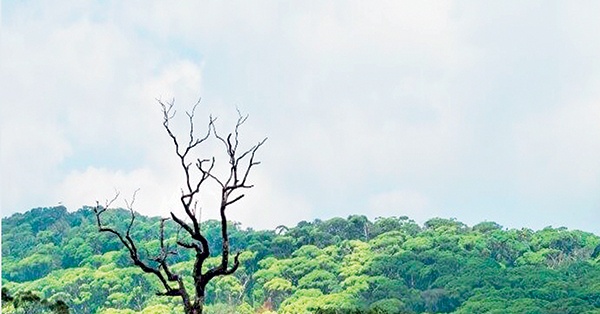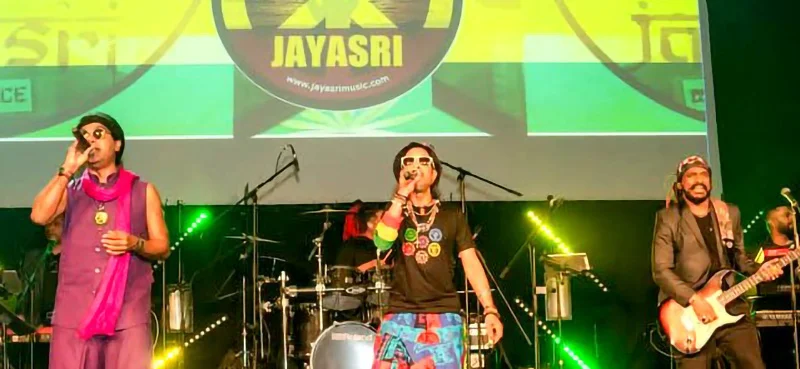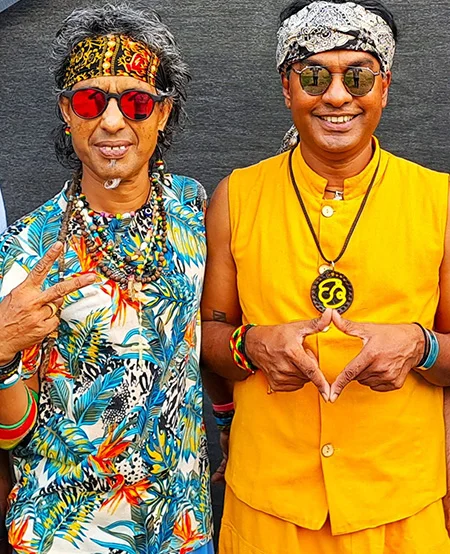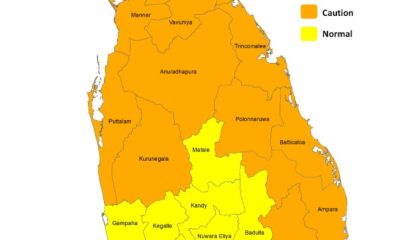Features
More on rape of forests:

Self-appointed economists drop drips of wisdom
It is good to see and read the hoo haa that is being raised over rapid deforestation in Free Sri Lanka. Sunday Punch in the Sunday Times of November 29 dealt this blow: “New writ opens season to slam the country’s rainforest canopy: 700,000 hectares of forest land condemned to face the axe before the altar of Mammon.” Punched well but will it have any effect? Will the new ordinance be changed? Will racketeers and shitty money makers stop felling trees, even if it’s forbidden by law? Most think only of immediate personal gain and to hell with the country and its welfare, fauna and flora included!
A recent The Island editorial described an ugly incident in Polonnruwa, where the State Minister of Wildlife Protection and Forest Resource Development, Wimalaweera Dissanayake, “had conniptions, when Wildlife Officers refused to follow his order that villagers be allowed to graze their cattle inside wildlife sanctuaries What he was doing was to violate the Fauna and Flora Protection Ordinance.” Can you see the tragic irony of the situation? Here the State Minister is going against his TORS and mandate. Not only does this sentence show how corrupt things have become normal, but also taught readers a new word: conniptions. Cass had to google fast to get its meaning, which is “a fit of hysterical excitement or anger.” How very apt! We are justified in mixing in a pinch of insanity caused by temporary power and of course self interest into the aforesaid incident. Female forest officer Devani Jayathilake should be greeted with hosannas all over again. She boldly argued with State Minister Sanath Nishantha to save a mangrove earmarked for an ostensible playground but thought to have a hotel built. We saw how that State Minister ranted at the woman, in dire conniption! His power was being challenged while his devious plans were exposed. Many men just stood around, Cass remembers, as Devani stood her ground for country – alone and unaided.
Pseudo economists Sunday Punch
on 29 November also dealt a strong punch with the sub heading “Wimal’s 5000 buck shot”. The article read thus: “Perhaps Weerasangilige Wimal Weerawansa was born with the proverbial silver spoon stuffed in his oral cavity right down to…” Yes, one could think thus observing the luxury he ensconces himself and his family in, sunk in further luxury as he drives around,  oops sorry – as he is escorted around in his government luxury vehicle costing millions. May be what we heard him say about not having 25 rupees to join a school field trip to Sigiriya was in a previous birth.
oops sorry – as he is escorted around in his government luxury vehicle costing millions. May be what we heard him say about not having 25 rupees to join a school field trip to Sigiriya was in a previous birth.
Now he is turned pro-government economist pronouncing the Rs 5000 handout to the poorest of the daily employed should suffice for an entire month for his/her family! Won’t last a single man for basic living for even a week; with prices what they are.
He is following in the older footsteps of economist pundit, earlier tuition master, who made a similar statement. They sound as if these blighted disadvantaged are lice or mice!
Of course, Cassandra must add that people on the whole are never satisfied and demand bigger handouts whenever there is even a whiff of economically straightened circumstances. It’s always asking for more and in such an ugly fashion with insults hurled at the government. If the men folk stopped imbibing or drug taking and a bit of savings was done, they could try at least to weather difficult times instead of expecting full manna to fall to them as if it is fully deserved.
Demeaning TV clips
Cass is certain others join her when she opines that TV cameras should not, or very briefly shoot scenes where women go to town howling, crying, clawing and hurling insults. When the unemployed locked-down are shown on TV and after the Mahara prison riot these scenes were focused on woman tearing their hair, screaming and sobbing and even fainting with sheer sorrow. At what? Their rioting kinsman and women prisoners. If only they had restrained them and showed such concern when they were peddling drugs or actually abusing it.
More restraint is called for. Our people will not contain their exuberant emotions, mostly of sadness or revenge and hate, and hardly ever behave with dignity and the calmness all religions advocate. Cameras should not focus on such.
Judging execution of duties depends entirely on political party in power
Headline in a Sunday newspaper of November 29 read thus: “HRCSL concerned over health and threats to Shani’s life”. Shani Abeysekara, ex-CID Director, is the person imprisoned and now in danger of his life having contracted Covid-19. His crime and reason for his arrest and incarceration are having done his duty diligently during his tenure of service. What we see now is that good duty served gets classified as crimes when governments change with different parties grabbing the reins of government. What was a crime then is not so now and the diligent, dutiful and hard-working official is termed a criminal when new leaders come marching in. Efficient public servants of then deserve punishment. Mistakes, misappropriation of funds then is pardoned and blameless now. And so the roller coaster moves with changes of government. And who ultimately suffers: WE the PEOPLE. We will have no police or judges or anyone to rely on. The stealer of a coconut then, will continue to be the stealer now and he of course gets more than his due punishment since he carries not a smithereen of clout. He is expendable. Hence our quandary: battered on one front by Covid; on another by economic and financial deprivation; and a third front buffeted by fractured faith in government and its long arms.
Cass sadly supposes this beautiful land of ours will never see a Nelson Mandela at the helm of government. Also, never an admittance of a fault or mistake by big bugs in power.
An unexpected flash of sunshine
Cass watched the BBC 1000 Women in their series Witness History on Tuesday December 01 feeling doom, gloom and despair. All driven away by the shy smile of Mrs Sirimavo Bandaranaike featured beautifully as the world’s first woman Prime Minister. As her daughter Sunethra narrated, she rose to the elevated job very soon and held her own with dignity and sureness amongst world leaders. Those were the politicians my friend! Maybe many of them were good not being born, bred, trained and tainted as poli-tikkas. They all had their warts, big and small, but in the long run we could be proud of them, and they did serve the country and its people. To when? JRJ? Mould seems to have been broken by the bludgeon of self interest, and monetary and power gain. We had faith of a resurrection with the election of the present Prez.
With a woman at the helm of the health ministry it had to be a man – Leader of Opp – who proposed that hygienic needs of women be tax free. Scotland gives all products free having passed that in their Parliament. Our minister is too busy with the mumbo jumbo of the esoteric.
Es vaha?
Oh, deari deari me! Such a pity Biden’s playing with his dog caused him to take a toss and suffer a hairline fracture, necessitating the wearing of orthopedic boots for a while. Anyways, thank heavens it was only a minor accident. Cass of course, given to cursing and the evil tongue, is sure it was es and kata vaha, meaning the evil eye and tongue that brought on the mishap. Inevitable when a good man succeeds. Sure, Trump would have swung his golf club the harder with delight
Features
An opportunity to move from promises to results

The local government elections, long delayed and much anticipated, are shaping up to be a landmark political event. These elections were originally due in 2023, but were postponed by the previous government of President Ranil Wickremesinghe. The government of the day even defied a Supreme Court ruling mandating that elections be held without delay. They may have feared a defeat would erode that government’s already weak legitimacy, with the president having assumed office through a parliamentary vote rather than a direct electoral mandate following the mass protests that forced the previous president and his government to resign. The outcome of the local government elections that are taking place at present will be especially important to the NPP government as it is being accused by its critics of non-delivery of election promises.
Examples cited are failure to bring opposition leaders accused of large scale corruption and impunity to book, failure to bring a halt to corruption in government departments where corruption is known to be deep rooted, failure to find the culprits behind the Easter bombing and failure to repeal draconian laws such as the Prevention of Terrorism Act. In the former war zones of the north and east, there is also a feeling that the government is dragging its feet on resolving the problem of missing persons, those imprisoned without trial for long periods and return of land taken over by the military. But more recently, a new issue has entered the scene, with the government stating that a total of nearly 6000 acres of land in the northern province will be declared as state land if no claims regarding private ownership are received within three months.
The declaration on land to be taken over in three months is seen as an unsympathetic action by the government with an unrealistic time frame when the land in question has been held for over 30 years under military occupation and to which people had no access. Further the unclaimed land to be designated as “state land” raises questions about the motive of the circular. It has undermined the government’s election campaign in the North and East. High-level visits by the President, Prime Minister, and cabinet ministers to these regions during a local government campaign were unprecedented. This outreach has signalled both political intent and strategic calculation as a win here would confirm the government’s cross-ethnic appeal by offering a credible vision of inclusive development and reconciliation. It also aims to show the international community that Sri Lanka’s unity is not merely imposed from above but affirmed democratically from below.
Economic Incentives
In the North and East, the government faces resistance from Tamil nationalist parties. Many of these parties have taken a hardline position, urging voters not to support the ruling coalition under any circumstances. In some cases, they have gone so far as to encourage tactical voting for rival Tamil parties to block any ruling party gains. These parties argue that the government has failed to deliver on key issues, such as justice for missing persons, return of military-occupied land, release of long-term Tamil prisoners, and protection against Buddhist encroachment on historically Tamil and Muslim lands. They make the point that, while economic development is important, it cannot substitute for genuine political autonomy and self-determination. The failure of the government to resolve a land issue in the north, where a Buddhist temple has been put up on private land has been highlighted as reflecting the government’s deference to majority ethnic sentiment.
The problem for the Tamil political parties is that these same parties are themselves fractured, divided by personal rivalries and an inability to form a united front. They continue to base their appeal on Tamil nationalism, without offering concrete proposals for governance or development. This lack of unity and positive agenda may open the door for the ruling party to present itself as a credible alternative, particularly to younger and economically disenfranchised voters. Generational shifts are also at play. A younger electorate, less interested in the narratives of the past, may be more open to evaluating candidates based on performance, transparency, and opportunity—criteria that favour the ruling party’s approach. Its mayoral candidate for Jaffna is a highly regarded and young university academic with a planning background who has presented a five year plan for the development of Jaffna.
There is also a pragmatic calculation that voters may make, that electing ruling party candidates to local councils could result in greater access to state funds and faster infrastructure development. President Dissanayake has already stated that government support for local bodies will depend on their transparency and efficiency, an implicit suggestion that opposition-led councils may face greater scrutiny and funding delays. The president’s remarks that the government will find it more difficult to pass funds to local government authorities that are under opposition control has been heavily criticized by opposition parties as an unfair election ploy. But it would also cause voters to think twice before voting for the opposition.
Broader Vision
The government’s Marxist-oriented political ideology would tend to see reconciliation in terms of structural equity and economic justice. It will also not be focused on ethno-religious identity which is to be seen in its advocacy for a unified state where all citizens are treated equally. If the government wins in the North and East, it will strengthen its case that its approach to reconciliation grounded in equity rather than ethnicity has received a democratic endorsement. But this will not negate the need to address issues like land restitution and transitional justice issues of dealing with the past violations of human rights and truth-seeking, accountability, and reparations in regard to them. A victory would allow the government to act with greater confidence on these fronts, including possibly holding the long-postponed provincial council elections.
As the government is facing international pressure especially from India but also from the Western countries to hold the long postponed provincial council elections, a government victory at the local government elections may speed up the provincial council elections. The provincial councils were once seen as the pathway to greater autonomy; their restoration could help assuage Tamil concerns, especially if paired with initiating a broader dialogue on power-sharing mechanisms that do not rely solely on the 13th Amendment framework. The government will wish to capitalize on the winning momentum of the present. Past governments have either lacked the will, the legitimacy, or the coordination across government tiers to push through meaningful change.
Obtaining the good will of the international community, especially those countries with which Sri Lanka does a lot of economic trade and obtains aid, India and the EU being prominent amongst these, could make holding the provincial council elections without further delay a political imperative. If the government is successful at those elections as well, it will have control of all three tiers of government which would give it an unprecedented opportunity to use its 2/3 majority in parliament to change the laws and constitution to remake the country and deliver the system change that the people elected it to bring about. A strong performance will reaffirm the government’s mandate and enable it to move from promises to results, which it will need to do soon as mandates need to be worked at to be long lasting.
by Jehan Perera
Features
From Tank 590 to Tech Hub: Reunited Vietnam’s 50-Year Journey

 The fall of Saigon (now Ho Chi Minh City – HCM) on 30 April 1975 marked the end of Vietnam’s decades-long struggle for liberation—first against French colonialism, then U.S. imperialism. Ho Chi Minh’s Viet Minh, formed in 1941, fought Japanese occupiers and later defeated France at Dien Bien Phu (1954). The Geneva Accords temporarily split Vietnam, with U.S.-backed South Vietnam blocking reunification elections and reigniting conflict.
The fall of Saigon (now Ho Chi Minh City – HCM) on 30 April 1975 marked the end of Vietnam’s decades-long struggle for liberation—first against French colonialism, then U.S. imperialism. Ho Chi Minh’s Viet Minh, formed in 1941, fought Japanese occupiers and later defeated France at Dien Bien Phu (1954). The Geneva Accords temporarily split Vietnam, with U.S.-backed South Vietnam blocking reunification elections and reigniting conflict.
The National Liberation Front (NLF) led resistance in the South, using guerrilla tactics and civilian support to counter superior U.S. firepower. North Vietnam sustained the fight via the Ho Chi Minh Trail, despite heavy U.S. bombing. The costly 1968 Tet Offensive exposed U.S. vulnerabilities and shifted public opinion.
Of even more import, the Vietnam meat-grinder drained the U.S. military machine of weapons, ammunition and morale. By 1973, relentless resistance forced U.S. withdrawal. In March 1975, the Vietnamese People’s Army started operations in support of the NLF. The U.S.-backed forces collapsed, and by 30 April the Vietnamese forces forced their way into Saigon.
At 11 am, Soviet-made T-54 tank no. 843 of company commander Bui Quang Than rammed into a gatepost of the presidential palace (now Reunification Palace). The company political commissar, Vu Dang Toan, following close behind in his Chinese-made T-59 tank, no. 390, crashed through the gate and up to the palace. It seems fitting that the tanks which made this historic entry came from Vietnam’s principal backers.
Bui Quang Than bounded from his tank and raced onto the palace rooftop to hoist the NLF flag. Meanwhile, Vu Dang Toan escorted the last president of the U.S.-backed regime, Duong Van Minh, to a radio station to announce the surrender of his forces. This surrender meant the liberation not only of Saigon but also of the entire South, the reunification of the country, and a triumph of perseverance—a united, independent nation free from foreign domination after a 10,000-day war.
Celebrations
On 30 April 2025, Vietnam celebrated the 50th anniversary of the Liberation of the South and National Reunification. HCM sprouted hundreds of thousands of national flags and red hammer-and-sickle banners, complemented by hoardings embellished with reminders of the occasion – most of them featuring tank 590 crashing the gate.
Thousands of people camped on the streets from the morning of 29 April, hoping to secure good spots to watch the parade. Enthusiasm, especially of young people, expressed itself by the wide use of national flag t-shirts, ao dais (traditional long shirts over trousers), conical hats, and facial stickers. This passion may reflect increasing prosperity in this once impoverished land.
The end of the war found Vietnam one of the poorest countries in the world, with a low per capita income and widespread poverty. Its economy struggled due to a combination of factors, including wartime devastation, a lack of foreign investment and heavy reliance on subsistence agriculture, particularly rice farming, which limited its potential for growth. Western sanctions meant Vietnam relied heavily on the Soviet Union and its socialist allies for foreign trade and assistance.
The Vietnamese government launched Five-Year Plans in agriculture and industry to recover from the war and build a socialist nation. While encouraging family and collective economies, it restrained the capitalist economy. Despite these efforts, the economy remained underdeveloped, dominated by small-scale production, low labour productivity, and a lack of modern technology. Inflexible central planning, inept bureaucratic processes and corruption within the system led to inefficiencies, chronic shortages of goods, and limited economic growth. As a result, Vietnam’s economy faced stagnation and severe hyperinflation.
These mounting challenges prompted the Communist Party of Vietnam to introduce Đổi Mới (Renovation) reforms in 1986. These aimed to transition from a centrally planned economy to a “socialist-oriented market economy” to address inefficiencies and stimulate growth, encouraging private ownership, economic deregulation, and foreign investment.
Transformation
Đổi Mới marked a historic turning point, unleashing rapid growth in agricultural output, industrial expansion, and foreign direct investment. Early reforms shifted agriculture from collective to household-based production, encouraged private enterprise, and attracted foreign investment. In the 2000s, Vietnam became a top exporter of textiles, electronics, and rice, shifting towards high-tech manufacturing (inviting Samsung and Intel factories). By the 2020s, it emerged as a global manufacturing hub, the future focus including the digital economy, green energy, and artificial intelligence.
In less than four decades, Vietnam transformed from a poor, agrarian nation into one of Asia’s fastest-growing economies, though structural reforms are still needed for sustainable development. Growth has remained steady, at 5-8% per year.
Vietnam’s reforms lifted millions out of poverty, created a dynamic export-driven economy, and improved education, healthcare, and infrastructure. This has manifested itself in reducing extreme poverty from 70% to 1%, increasing literacy to 96%, life expectancy from 63 to 74 years, and rural electrification from less than 50% to 99.9%. Industrialisation drove urbanisation, which doubled from 20% in 1986 to 40% now.
This change displayed itself during the celebrations in HCM, amid skyscrapers, highways and the underground metro system. Everybody dressed well, and smartphones could be seen everywhere – penetration has reached three-fourths of the population. Thousands turned out on motorbikes and scooters (including indigenous electric scooters) – two-wheeler ownership is over 70%, the highest rate per capita in ASEAN. Traffic jams of mostly new cars emphasised the growth of the middle class.
At the same time, street food vendors and makeshift pavement bistro owners joined sellers of patriotic hats, flags and other paraphernalia to make a killing from the revellers. This reflects the continuance of the informal sector– currently representing 30% of the economy.
The Vietnamese government channelled tax income from booming sectors into underdeveloped regions, investing in rural infrastructure and social welfare to balance growth and mitigate urban-rural inequality during rapid economic expansion. Nevertheless, this economic transformation came with unequal benefits, exacerbating income inequality and persistent gender gaps in wages and opportunities. Sustaining growth requires tackling corruption, upgrading workforce skills, and balancing development with inequality.
NLF flag

Tank 390 courtesy Bao Hai Duong
The parade itself, meticulously carried out (having been rehearsed over three days), featured cultural pageants and military displays and drew admiration. Of special note, the inclusion of foreign military contingents from China, Laos, and Cambodia for the first time signalled greater regional solidarity, acknowledging their historical support while maintaining a balanced foreign policy approach.
Veteran, war-era foreign journalists noted another interesting fact: the re-emergence of the NLF flag. Comprising red and blue stripes with a central red star, this flag had never been prominent at the ten-year anniversary celebrations. The journalists questioned its sudden reappearance. It may be to give strength to the idea of the victory being one of the South itself, part of a drive to increase unity between North and South.
Before reunification in 1975, North and South Vietnam embodied starkly contrasting economic and social models. The North operated under a centrally planned socialist system, with collectivised farms and state-run industries. It emphasised egalitarianism, mass education, and universal healthcare while actively preserving traditional Vietnamese culture. The South, by contrast, maintained a market-oriented economy heavily reliant on agricultural exports (rice and rubber) and foreign aid. A wealthy elite dominated politics and commerce, while Western—particularly American—cultural influence grew pervasive during the war years.
Following reunification under the Socialist Republic of Vietnam (1976), the government moved swiftly to integrate the two regions. In 1978, it introduced a unified national currency (the đồng, VND), merging the North’s and South’s financial systems into a single, state-controlled framework. The unification of monetary policy symbolised the broader ideological project: to erase colonial and capitalist legacies.
Unity and solidarity
However, the economic disparities and cultural divides between regions persist, though less pronounced than before. The South, particularly HCM, remains Vietnam’s economic powerhouse, with a stronger private sector and international trade connections. The North, including Hanoi, has a more government-driven economy. Southerners tend to have a more entrepreneurial mindset, while Northerners are often seen as more traditional and rule-bound. Conversely, individuals from the North occupy more key government positions.
Studies suggest that people in the South exhibit lower trust in the government compared to those in the North. HCM tends to have stronger support for Western countries like the United States, while Hanoi has historically maintained closer ties with China. People in HCM tend to use the old “Saigon” city name.
Consequently, the 50th anniversary celebrations saw a focus on reconciliation and unity, reflecting a shift in perspective towards peace and friendship, as well as accompanying patriotism with international solidarity.
The exuberant crowds, modern infrastructure, and thriving consumer economy showcased the transformative impact of Đổi Mới—yet lingering regional disparities, informal labour challenges, and unequal gains remind the nation that sustained progress demands inclusive reforms. The symbolic return of the NLF flag and the emphasis on unity underscored a nuanced reconciliation between North and South, honouring shared struggle while navigating enduring differences.
As Vietnam strides forward as a rising Asian economy, it balances its socialist legacy with global ambition, forging a path where prosperity and patriotism converge. The anniversary was not just a celebration of the past but a reflection on the complexities of Vietnam’s ongoing evolution.
(Vinod Moonesinghe read mechanical engineering at the University of Westminster, and worked in Sri Lanka in the tea machinery and motor spares industries, as well as the railways. He later turned to journalism and writing history. He served as chair of the Board of Governors of the Ceylon German Technical Training Institute. He is a convenor of the Asia Progress Forum, which can be contacted at asiaprogressforum@gmail.com.)
By Vinod Moonesinghe
Features
Hectic season for Rohitha and Rohan and JAYASRI

 The Sri Lanka music scene is certainly a happening place for quite a few of our artistes, based abroad, who are regularly seen in action in our part of the world. And they certainly do a great job, keeping local music lovers entertained.
The Sri Lanka music scene is certainly a happening place for quite a few of our artistes, based abroad, who are regularly seen in action in our part of the world. And they certainly do a great job, keeping local music lovers entertained.
Rohitha and Rohan, the JAYASRI twins, who are based in Vienna, Austria, are in town, doing the needful, and the twosome has turned out to be crowd-pullers.
Says Rohitha: Our season here in Sri Lanka, and summer in the south hemisphere (with JAYASRI) started in October last year, with many shows around the island, and tours to Australia, Japan, Dubai, Doha, the UK, and Canada. We will be staying in the island till end of May and then back to Austria for the summer season in Europe.”
Rohitha mentioned their UK visit as very special.

The JAYASRI twins Rohan and Rohitha
“We were there for the Dayada Charity event, organised by The Sri Lankan Kidney Foundation UK, to help kidney patients in Sri Lanka, along with Yohani, and the band Flashback. It was a ‘sold out’ concert in Leicester.
“When we got back to Sri Lanka, we joined the SL Kidney Foundation to handover the financial and medical help to the Base Hospital Girandurukotte.
“It was, indeed, a great feeling to be a part of this very worthy cause.”
Rohitha and Rohan also did a trip to Canada to join JAYASRI, with the group Marians, for performances in Toronto and Vancouver. Both concerts were ‘sold out’ events.
They were in the Maldives, too, last Saturday (03).

Alpha Blondy:
In action, in
Colombo, on
19th July!
JAYASRI, the full band tour to Lanka, is scheduled to take place later this year, with Rohitha adding “May be ‘Another legendary Rock meets Reggae Concert’….”
The band’s summer schedule also includes dates in Dubai and Europe, in September to Australia and New Zealand, and in October to South Korea and Japan.
Rohitha also enthusiastically referred to reggae legend Alpha Blondy, who is scheduled to perform in Sri Lanka on 19th July at the Air Force grounds in Colombo.
“We opened for this reggae legend at the Austria Reggae Mountain Festival, in Austria. His performance was out of this world and Sri Lankan reggae fans should not miss his show in Colombo.”
Alpha Blondy is among the world’s most popular reggae artistes, with a reggae beat that has a distinctive African cast.
Calling himself an African Rasta, Blondy creates Jah-centred anthems promoting morality, love, peace, and social consciousness.
With a range that moves from sensitivity to rage over injustice, much of Blondy’s music empathises with the impoverished and those on society’s fringe.
-

 Sports7 days ago
Sports7 days agoOTRFU Beach Tag Rugby Carnival on 24th May at Port City Colombo
-

 News5 days ago
News5 days agoRanil’s Chief Security Officer transferred to KKS
-

 Opinion3 days ago
Opinion3 days agoRemembering Dr. Samuel Mathew: A Heart that Healed Countless Lives
-

 Features6 days ago
Features6 days agoThe Broken Promise of the Lankan Cinema: Asoka & Swarna’s Thrilling-Melodrama – Part IV
-

 Features7 days ago
Features7 days agoTrump tariffs and their effect on world trade and economy with particular
-

 News6 days ago
News6 days agoRadisson Blu Hotel, Galadari Colombo appoints Marko Janssen as General Manager
-

 Business5 days ago
Business5 days agoCCPI in April 2025 signals a further easing of deflationary conditions
-

 Features6 days ago
Features6 days agoA piece of home at Sri Lankan Musical Night in Dubai





















